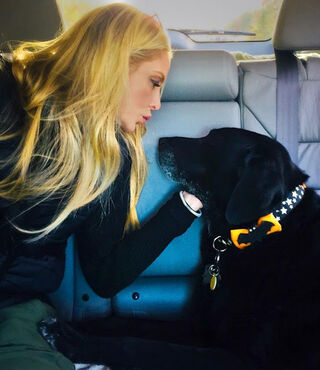Animal Behavior
How Pets Help Us Grieve
An Interview with Jenna Blum about her memoir, "Woodrow on the Bench."
Posted October 17, 2021 Reviewed by Jessica Schrader
There’s lots of research showing that pets help to ease the grieving process for humans. For example, petting a dog increases serotonin and dopamine levels in the brain, which lowers the stress, anxiety, and depression associated with grieving. In Jenna Blum’s touching new memoir, Woodrow on the Bench, she opens up about how her beloved black Lab, the “George Clooney of dogs,” helped her through a difficult time after her mom died. And then, in a full circle of love, Jenna cared for Woodrow during his final days. Here’s more from Jenna:

Jennifer Haupt: You're an accomplished fiction writer. What made you try your hand at memoir?
Jenna Blum: Thank you! I didn’t feel I had a choice. Perhaps the best-known writing adage is “write what you know,” which I personally think should be “write what you love”—and it’s often the same thing. Woodrow was the durable love of my life—“my North, my South, my East, my West/my workday week and Sunday rest,” as Auden wrote. Woodrow was my companion, structure, and daily joy. When he was gone, there was no better tribute to him than to use the skills I’ve spent my life honing to preserve some of his amazing personality and the lessons he taught me. And to give thanks to the community that lifted us both up. So: memoir!
JH: This is such a sweet and touching slice of your life. (The first few pages had me tearing up!) What first made you fall in love with Woodrow? How did you know he was the right dog for you?
JB: Thank you again—and same answer: no choice. Woodrow came to me as a puppy; the guy I was dating at the time took me for a drive one fall afternoon to a breeder on Cape Cod, “just to look” at the puppies. Of course, that’s against the law of physics: nobody ever just looks at the puppies. I fell in love with Woodrow instantly, and like any relationship, that love was tested over time. Especially by the antic puppy years. Woodrow taught me that my life would expand in proportion to the love I let into it, that no matter how much work a dog is, he gives you so much more.
JH: You say that much of your happiness and stability was predicated by your old dog. He was 13 when your mom died. How did Woodrow help you through the grieving process of losing her?
JB: After one of the last visits I had with my mom—my brother and his fiancé were her full-time caretakers, in Florida, and I stayed with them as often as I could—I came home and there, as always, was Woodrow. Giving me what I called “the cold hinder”—he always turned his butt to me when I’d been away, affronted that I’d dared leave him. He was 14 then, arthritic, with plenty of what I called the George Clooney gray, cataracts, and breath like low tide. I got down on the floor of my study with him and put my arms around him and bawled—much to his annoyance. (Woodrow was not one of those comfort dogs; he was always like, “Get it together, Mommoo, the dog needs a hamburger.”) It was a real ugly cry; I was literally howling, my mouth that weird square shape. I couldn’t stand that my mom was dying and my dog was getting old too—I couldn’t lose them both at the same time. Having Woodrow to care for stabilized me.
JH: Were you still grieving for your mom when you first found out Woodrow was terminally ill?
JB: I was. Grief is a peculiar shape-shifting beast, coming to you in different forms for different people. When my dad died of a thunderclap heart attack, I knew I was grieving. I wanted to wander a desert for years, wearing black clothes and tearing my hair. When my mom died, I felt confused, like Bambi after the forest fire. It’s such a primary relationship, the mother-daughter one, and so big that I couldn’t really tell what it meant that she was gone. She just was. I carried that knowledge around with me like a weight, shoving it behind me while I went on with my life—which then involved book tour for my third novel. When I found out Woodrow had congestive heart failure, for which there was no cure, the first thing I did was ask both my parents to watch out for him when his time came to cross the river, and I cried. I didn’t cry much for my mom. I cried so much over Woodrow. So yes, I was still grieving, and Woodrow helped me express it. I am still grieving, for both of them.
JH: You say that Woodrow's illness, and the realization he would die, was more difficult than losing your mom. Why is that?
JB: I loved my mom, who was basically Aurora Greenway in Terms of Endearment but with red hair—a provocateur. We were very close; we talked on the phone a lot, and she sent me very weird emojis. But our relationship was long-distance, and mine with Woodrow was much more immediate. I woke with him every morning and his needs, walks and food and medicine and play, formed my schedule—a necessary scaffolding for a writer who lived and worked alone. Caring for him was a full-time occupation, especially after he got sick. And prior to Woodrow, I’d had a hard time making friends who weren’t writers—I just couldn’t find the necessary conversational currency. Woodrow gave me entrée into a society of dog parents and a way to make strangers into friends. I knew all of that, my structure, my laughter, my community—might be imperiled by his passing, and I greatly feared being completely alone.
JH: I love all of the happy times with your wise old "George Clooney of dogs" that you portray in this book, even during the last months of his life. The bacon and champagne party for his 15th birthday is hilarious! What did caring for Woodrow teach you about humor in relationship to grief?
JB: Thank you for mentioning the humor in Woodrow on the Bench—as in life, I think it acts as a leaven to the very serious things we cope with. One thing people don’t know about death before they lose a beloved is that there’s often a macabre humor to it. I learned this when my dad died and all of his former wives and girlfriends came to the memorial, my mom giving them the slit-eye from where she was smoking behind a potted plant. And when my mom died and her former lover called me to dissect her personality while I was sitting in her driveway in a bikini, taking a break from packing up her clothes. It’s just surreal. With Woodrow, while I was pre-grieving in his final months, there were things like the “Poopsplosion”—my poor old guy had a bad reaction to his heart medication that resulted in my apartment looking like a horror movie but with poop instead of blood. The image of my friend/former fiancé Jim, who was visiting us then, rushing in to help us by bringing a dish drainer, of all things, still makes me laugh to this day.
JH: How important was your human community during the time you were caring for Woodrow toward the end of his life?
JB: My human community was everything. Is everything. I’m a person who grew up wanting that One True Love and believing that it had to be a romantic partner. I’ve had wonderful relationships with many lovely men, but when Woodrow died, I was between partners, and I’ve chosen not to have children, so I thought I was without that intimate, crucial love and support. Woodrow and our community taught me otherwise. Our writer friends came to work in the apartment with me when he wasn’t mobile. Our dog-parent friends came to sit with us on the bench, in all weathers, with their dogs and coffee and treats. Tourists tractor-beamed in by Woodrow’s Clooney elegance kept us company; strangers stopped traffic for us, helped me carry him, sought us out from social media posts, brought us food. When Woodrow died, I was not alone for one moment; friends stayed with me 24/7 in a kind of shiva; sent cards, casseroles, gifts, and flowers; held a memorial. Nobody said, “He was just a dog.” They said: “We loved him. We love you.” If that isn’t love, what is?
JH: What's the One True Thing you learned from Woodrow about love?
JB: That it comes in many nuanced and myriad forms, sometimes from places you least expect it, and it never dies.
Jenna Blum is the New York Times and # 1 internationally bestselling author of the novels Those Who Save Us, The Stormchasers, and The Lost Family. She is also the author of a new memoir, Woodrow on the Bench. Jenna is based in Boston, where she lives across from Woodrow’s bench and is currently a dog mom to her black Lab puppy Henry Higgins.


